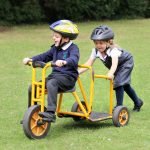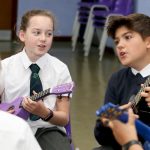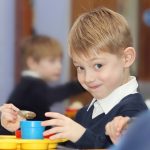Class 5 Newsletter Autumn Term
Autumn Newsletter, Year 5
Welcome to Year 5! We hope you have enjoyed your holidays and, like us, are looking forward to a busy term in class. We outline below the curriculum areas to be covered this term as well as ways you can help us to support your child’s learning in Year 5.
English
As the children grow in independence and maturity in their reading and their writing, we will be supporting them to develop their own voices, discussing and highlighting the options available to them, both stylistically and in their choices of vocabulary. We will be encouraging self-assessment to develop the children’s awareness of detail, particularly in spelling and punctuation, and will be discussing the texts we read in class, expressing our own ideas and responses and justifying these with evidence found within the texts. We will begin the term with the study of a visual text, The Alchemist’s Letter, and will follow this by looking at Greek Myths and writing argument texts inspired by the Elgin Marbles issue. We will also be reading some classic narrative poetry – Alfred Noyes’ The Highwayman – and considering our responses to poetry. We will continue to follow the spellings programme and will be asking the children to practise these at home as well as school, familiarising themselves with the spelling words and noting their use within texts.
Maths
We will start this term by looking at place value in whole numbers. We will also cover written and mental addition and subtraction methods, including using column addition/subtraction to add/subtract pairs of 4/5-digit numbers. The children will practise their times tables regularly and they will use mental multiplication and division. They will multiply/divide by 10, 100, 1000 and write decimal numbers as tenths and hundredths. Children will add/subtract decimals and add/subtract equivalent fractions. When looking at measures, the children will measure and compare capacities, weights and lengths and convert between different units of measurement. They will solve problems involving time and calculate perimeters and areas. We will regularly set the children problem solving investigations to develop their problem solving and reasoning skills.
History and Geography
Greece will be the focus of our learning this year, the geography of Greece and the importance of tourism today followed by the study of Ancient Greece and its influence on life today. We will explore the issue of where artefacts such as the Elgin Marbles should reside (a particularly pertinent debate after the recent theft of items from the British Museum) and will consider what artefacts can teach us about daily life in Ancient Greece.
Science
For the first half term we will learn about the properties of materials. The children will compare and group together everyday materials on the basis of their properties, including their hardness, transparency, and conductivity (electrical and thermal). They will give reasons, based on evidence from comparative and fair tests, for the particular uses of everyday materials. In the second half term, we will be learning about forces; discussing what gravity and resistance are and identifying the effects of friction and water resistance. The children will have lots of opportunities to work scientifically, planning different types of scientific enquiries to answer questions. They will take measurements, use a range of scientific equipment, record results and report and present their findings.
Computing
The children will continue to learn about ESafety, looking at privacy and being a good ‘online citizen.’ We will also be covering the Computing Science side of the curriculum where the children will learn about coding. They will develop their own interactive games and begin to crack codes.
Art and DT
Our art during the autumn term will be inspired by Gustav Klimt’s Birchwoods paintings, developing the use of tonal colour in painting. We will be looking at identifying light sources and using shading and shadow consistently to reflect these. We will also be making simple pots in the style of ancient Greek pottery, using sgraffito techniques to apply patterns.
In DT, we will be exploring the contents of our allotments to design and make soups to inspire the kitchen staff!
RE and PSHE
In RE, this term we will focus on different viewpoints on Religion; what is meant by Atheist, Agnostic and Theist. Children will explore what a Christian belief is, what Humanists believe and what Pascal’s Wager is.
Our PSHE learning will lead us to think about citizenship and values, discussing how we can make a positive contribution and considering our feelings and relationships with others. This term in particular, we will be giving time to learning how our brains work, exploring our own wellbeing and re-enforcing this with mindful practices and learning.
Music
We are fortunate to continue to benefit from ‘Wider Opportunities’ tuition of music in Year 5. This term, the children will be using brass instruments.
PE
During the Autumn term, PE will be taught on a Monday and Wednesday afternoon and the children will need to come to school dressed for PE on these days. The children will be taught fitness and rugby for the first half term and football and dodgeball in the second half term.
French
Our key themes this term will be to describe family members and knowing the names of items of clothing, describing them with a range of adjectives. We will focus on developing the children’s ability to understand increasingly complex sentences and to build sentences of their own, adding adjectives and remembering the importance of ensuring that adjectives reflect gender and number in French. We will supplement the weekly lesson with short, additional sessions practising verbal and listening skills; any additional practise that you are able to offer at home is extremely beneficial for building confidence and embedding vocabulary in any new foreign language so please do give this a try if you feel able.
Homework and how you can support your child’s learning
The children will be asked to complete 3 pieces of homework each week; these will include spellings to practise (no need to hand these in) and one piece each of English and maths homework, each taking approximately 40 minutes to complete. Homework will be sent home in Learning Logs and Maths folders; English is usually set on a Wednesday, to be returned the following Monday, and Maths is set on a Friday, to be returned the following Thursday. Children will usually have the option of a ‘spicy’ extension to their homework, which they should tackle if they feel confident and only if they have not exceeded the time they should be taking to complete the work. Homework should build upon and consolidate work in class and it should be clear to your child what is required of them. Please limit your support to ensuring that they have the opportunity to complete their work in a timely fashion and that they present their work neatly and to the best of their ability. If they have any questions, we are always happy to answer them; the aim of our homework is to re-enforce the children’s classroom learning and to see that they are applying their learning independently, in line with national expectations.
Reading continues to be important for your child’s development; please encourage your child to sample a wide range of text types and support their interest in reading by discussing what they have read and by continuing to share texts together when possible. Reading aloud has been shown to be hugely beneficial even as the children’s independent reading ability grows so please maintain this where you can and record this in their reading journals. They should read daily at home where possible, completing reading challenges regularly as they wish.
If you have any particular concerns or issues you would like to discuss regarding your child, please do not hesitate to contact us (please contact the office and they will arrange for one of us to call you). Many thanks.
Mrs Rudkin and Mrs Gates



















